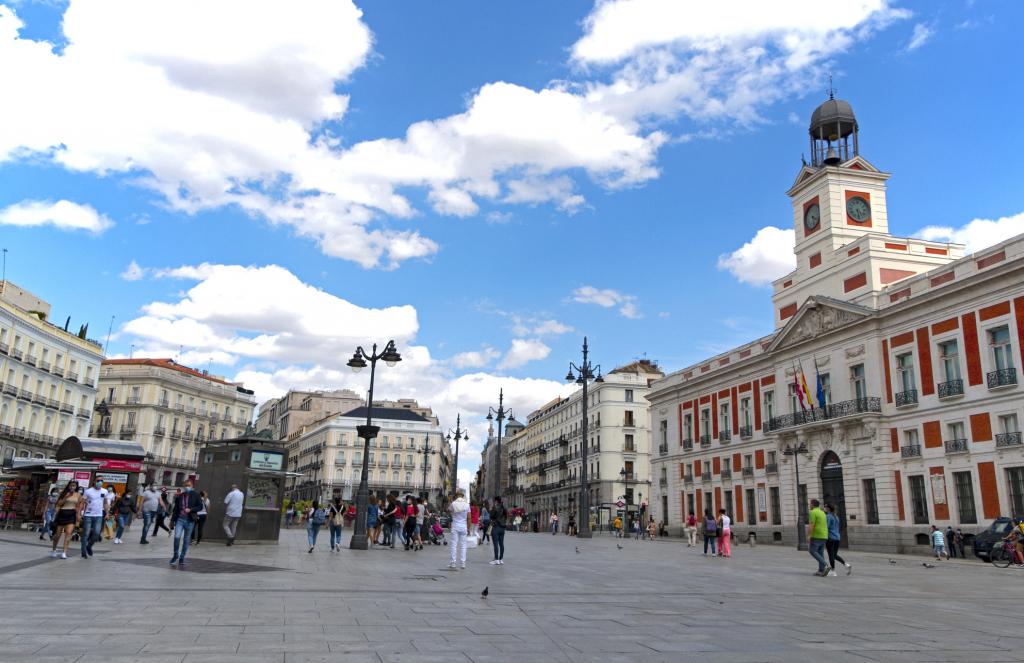Thessaloniki gets ready for its metro launch in November
The underground rapid transit lines have been under construction for almost two decades due to various project delays
 TheMayor.EU logo
TheMayor.EU logo 
Plaza del Sol, Madrid, Source: PUERTA DEL SOL MADRID, by José Javier Martin Espartosa on Flickr (CC BY-NC-SA 2.0)
Municipalities from the Spanish capital’s metropolitan south release their own common statement
Spain is the most affected country so far from the second coronavirus wave sweeping over Europe and Madrid is its most affected region. On that account, the national government has decided to impose mobility restrictions over the whole region in order to counteract the spread of the disease.
The Madrid Autonomous Government, however, is fervently opposing this development on the grounds that it is spreading unnecessary fear and agitation among the population. This afternoon another dimension to the infighting was added when the Municipalities of Alcalá de Henares, Alcorcón, Fuenlabrada, Getafe, Leganés, Móstoles and Parla, located to the south and east of the City of Madrid, released their own common statement which in turn criticizes the backlash of the regional authorities.
With an infection rate of 780 per 100 000, Madrid Region is the epicentre of the new negative trend defining the return of Covid-19 to Europe. This rate is more than twofold when compared to the EU’s average of 300 per 100 000.
The seven municipalities in question declared their support to the Interterritorial Health Council policies and expressed disappointment with the regional government’s decision to fight said policies.
“The attitude of disobedience to the regulations adopted in the Interterritorial Council adopted by the Community of Madrid places us in front of a serious problem of crisis management from a social and coexistence point of view, with neighbours confused between what the National Government will establish and what will be carried out by the Local Police, National Police and Civil Guard against the "disobedience" proclaimed by the autonomous authorities,” was said in the common statement.
The management of the sanitary crisis is clearly starting to take on political colours which determine where the fault lines will be drawn. The reason being that the mayors of these municipalities, traditionally populated by working-class citizens, belong to PSOE, Spain’s socialist party – the same political orientation as the national government. On the other hand, Madrid’s autonomous administration has a PP (right-wing) mandate.
These seven municipalities were also the recipients of the first lockdown measures this autumn imposed. They are all large cities with over 100 000 inhabitants, and all fall under the national agreement for restrictions criteria.
However, they argue that these measures should also be extended to localities with less than 100 000 residents, as some of them are showing high rates of infections, too. As an example, they pointed out Collado Villalba (with a PP mayor) and an infection rate of 783 per 100 000.
How this will play out will be seen in the upcoming days when the National Health Ministry is set to publish the exact measures in the official state gazette.

The underground rapid transit lines have been under construction for almost two decades due to various project delays

Now you can get your wine in Talence by paying directly in Bitcoin

That’s because the state has to spend money on updating the railway infrastructure rather than subsidizing the cost of the popular pass

Rethinking renewable energy sources for the urban landscape

The examples, compiled by Beyond Fossil Fuels, can inform and inspire communities and entrepreneurs that still feel trepidation at the prospect of energy transition

Now you can get your wine in Talence by paying directly in Bitcoin

The 10th European Conference on Sustainable Cities and Towns (ESCT) sets the stage for stronger cooperation between the EU, national and local level to fast track Europe's transition to climate neutrality.

At least, that’s the promise made by the mayor of Paris, Anne Hidalgo

The underground rapid transit lines have been under construction for almost two decades due to various project delays

At least, that’s the promise made by the mayor of Paris, Anne Hidalgo

Hostal de Pinós is located in the geographical centre of the autonomous region

Despite its church-y name, the district has long been known as the hangout spot for the artsy crowds

Urban dwellers across the EU are having a say in making their surroundings friendlier to people and the environment.

Forests in the EU can help green the European construction industry and bolster a continent-wide push for architectural improvements.

Apply by 10 November and do your part for the transformation of European public spaces

An interview with the Mayor of a Polish city that seeks to reinvent itself

An interview with the newly elected ICLEI President and Mayor of Malmö

A conversation with the Mayor of Lisbon about the spirit and dimensions of innovation present in the Portuguese capital














